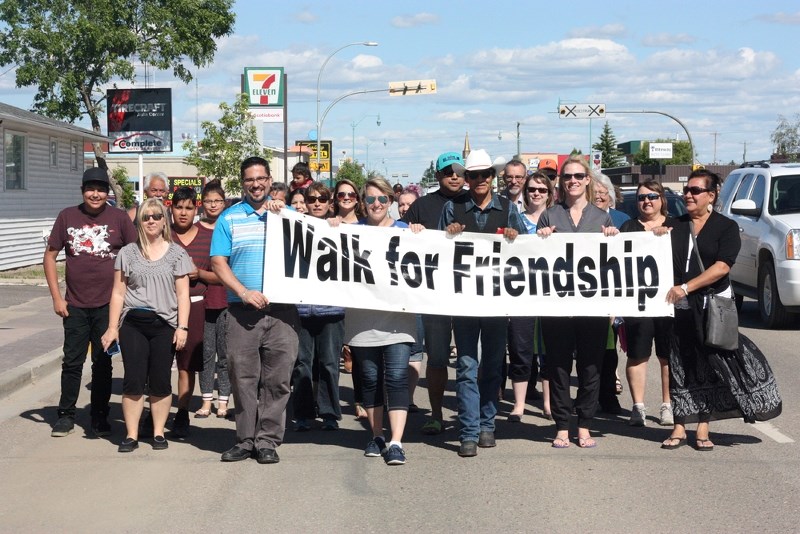National Aboriginal Day may be recognized only on June 21 in some parts of Canada, but in St. Paul, several groups collaborated to make for several days of events, bridge building and healing, under the banner Reconciliation –St. Paul.
“I’m really pleased with how things have gone to this point, albeit the weather,” Mannawanis Native Friendship Centre director Hinano Rosa said on Friday afternoon, noting that outdoor events planned for Wednesday and Thursday had to be moved to the centre due to high winds and the risk of rain.
However, by Friday, the skies had cleared and people of all backgrounds were able to join together in a walk through Town of St. Paul’s main street, carrying a giant banner reading “Walk for Friendship.”
The event brought together several partners, all sharing a desire to heal the wounds of past wrongs and to move forward together.
“The goal of reconciliation is to build better relationships in this community with all nationalities, all ethnic groups,” said Rosa, noting that events in the past have created pain and hardship in First Nations communities. Reconciliation aims to acknowledge those pains and mistakes, to recognize that St. Paul sits on Treaty 6 lands, and recognize the founding people, including First Nations and Metis people, he said.
Among the events held during the week were ceremonies, tipi teachings, traditional parenting talks, and more.
On Friday morning, elders held an honour song, while tipis were erected at Jaycee Ball Diamonds. Surrounded by the towering white tipis, St. Paul Education Regional Division’s Glenda Bristow led participants through a blanket exercise.
Participants began by moving freely over the spread-out blankets that represented Turtle Island, sharing gifts and acknowledging each other. However, as the exercise unfolded, Bristow removed blankets, reducing territory. People were asked to leave the increasingly smaller space as they fell victim to diseases from smallpox, tuberculosis and measles, or were left stranded from their lands as their status was stripped or their right to movement was suppressed, and they were taken from their families in the Sixties Scoop and during the history of residential schools.
Some were clearly shaken by the story, and others gathered to hold their shoulders, and comfort them as they shed tears.
Over time, participants applauded the small steps taken to restore First Nations people’s place and contributions within Canada, even as they acknowledged more work needed to be done.
“We call it the dark history of Canada,” said Bristow, adding that she has done this exercise a number of times with local schools, and yet, there are always people who say they don’t know this history.
As a sharing circle took place following the blanket exercise, several talked about the anger and sadness they felt on hearing this history unfold. Joanne Lamoureux said it was the first time she had been part of such an activity, and said she was grateful for the chance to be part of the event, saying, “It’s from a place of knowledge that we’ll be able to work together and heal together.”
One woman who described herself as a child of residential school survivors and historical trauma talked about how she felt the truth of what was spoken at the blanket exercise. She told Bristow that she felt this acknowledgment of the history was the way to climb out of the feelings of isolation, alcoholism, suicide and other problems that First Nations people face, saying, “I’m really glad you’re doing this, because this is what our people need to learn.”
The week wrapped up with St. Jean Baptiste Day and Multiculturalism Day, with Saddle Lake’s annual powwow running over the weekend. People of all backgrounds gathered to take in an art exhibit featuring work from artists such as Lana Whiskeyjack, George Pipe, Stewart Steinhauer, Herman Poulin, Tanis Shapka and more.
Poulin was on hand to help people paint their own landscapes, an homage to the wind-swept blue and green contrasts of the prairies.
During the evening, several came dressed for increasingly windy and cool weather and to listen to a diverse lineup of performers, with everything performed, from Ukrainian and French music to two gigues from Olivier Lampron, a rap performance from Kehewin’s Cys, and the vocal stylings of Wayne Jackson, and more.
“It’s the feast day of French Canadians, traditionally,” said Pierre Lamoureux of St. Jean Baptiste Day, noting the event has not been celebrated in St. Paul for the past few years. However, the local French association saw it as a good fit to partner with Reconciliation St. Paul and celebrate the day in conjunction with other activities.
“We thought it was important to show solidarity with the reconciliation movement,” Lamoureux said, adding he felt it was important to build ties with the Metis people, with whom the French share a close history, but also the greater indigenous population.
Sharon Steinhauer of the University of Blue Quills, which was also a partner in the event, said the weather was a challenge, and she had hoped to get more people out to the events of the week. However, she said, “Any time you can get different cultures in a shared space, I think that’s movement.”
The plan is to continue the event annually, but also to host events through the year aimed at restoring relationships and building reconciliation, she said.



